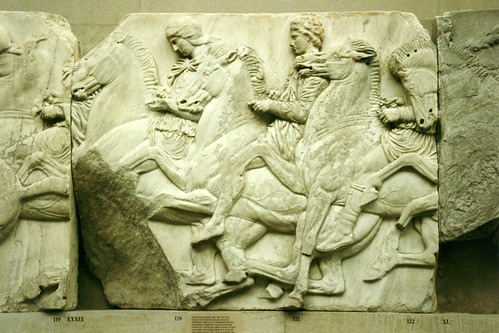It seems that almost everybody with an opinion has taken the political, and emotional, stance that the Elgin Marbles should return to Athens, so I was surprised to come across an article by Richard Dorment this week which stood firmly on the side on the marbles remaining in the British Museum (Ok, well it was in The Telegraph, so I shouldn’t have been that surprised).
For the sake of argument, let’s look at his main points:
“Lord Elgin paid the enormous sum of 39,000 to acquire the marbles, and was careful to obtain documents from the Turkish Government approving their removal from Greece, which had then been part of the Ottoman Empire for 350 years.”
This would be a valid point, and its the one that the British Museum rests most heavily on. However, only fragments of this document remain, and although these do grant some permissions, they dont quite seem to permit Elgin to simply cart off whatever he likes back to England. Whats more, the authenticity of this document is disputed. Professor Dimitriadis, a scholar from Crete, points out that two authenticating elements are missing from the document – the Sultans emblem (a tougras), and an invocation to God (davet tahmid). Without these elements, he questions whether the document was genuine. Also, the Ottoman Empire were foreign rulers who no longer exist should documents issued under their rule be adhered to now?
“Since Parliament legally purchased the marbles from Lord Elgin in 1816, the British Museums title to them is unassailable.”
Surely this is dependent on whether Elgin was the rightful owner of the marbles in the first place, and at liberty to sell them to the BM? See above.
“The British Government cannot simply transfer their ownership to another European state. Objects in our national museums belong in law not to parliament but to their trustees. This ensures that no government can sell works from our museums to raise revenue (as happened in Russia in the 1920s), or give them away for short- term political advantage.”
This sounds like a rather woolly loophole that can be called upon, or ignored, at will. The British Museum has already agreed to repatriate two bundles of aboriginal human remains to the Tasmanian Aboriginal Centre of Australia. Italy managed to return the obelisk of Axum to Ethiopia, and thousands of artefacts looted by the Nazis during WWII have been returned to the Jews. Repatriation happens all the time.
I’m sorry, Richard Dorment, but I’m afraid your arguments dont convince me. Although I couldn’t help but crack a smile at your suggestion that:
“The Greeks should erect a statue of Lord Elgin near the Parthenon to express their nation’s gratitude to him for saving the Marbles.”
Maybe that should be built into the conditions of repatriation?
Image by WV Jazzman. All rights reserved.




